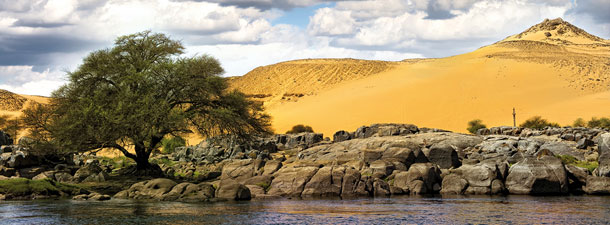
The Newsroom: Art Imitating a Bygone Reality
December 8, 2012
Seeking Balance in the Modern World: The Ancient Wisdom of Ayurveda
December 8, 2012Egypt is the “Gift of the Nile,” said Herodotus, some 3,000 years ago. That is still true today, but as the struggle for resources heats up along with the global temperature, the countries upstream of Egypt are starting to demand their fair share of the Nile’s gifts.
C
CAIRO: It is water. Water for all. At least this is the argument that upstream countries along the Nile River have been making for years, but Egypt continues to refuse to renegotiate a colonial-era treaty that would allocate more water for use in the upstream countries of the Nile Basin Initiative (NBI). Egypt says that without its access to water, the country could face severe shortages and possible nationwide upheaval.

In April, Egypt’s then Minister of Water Resources and Irrigation, Hisham Qandeel – now Prime Minister – reiterated Egypt’s firm stance of rejecting the Entebbe Agreement unless the water security of Egypt and the Sudan is achieved. This has left water issues in the region in a tenuous position, with the future of sustainability and cooperation in limbo.
“Egypt believes that cooperation between the Nile Basin countries can continue and that there are promising opportunities for integration, cooperation and partnership for all sides”, Qandeel added, affirming that “the Nile has enough water for all the riparian nations if it is used well”.

The dam near Aswan
Meanwhile, Qandeel said that Ethiopia has unilaterally announced that it will construct the Renaissance Dam and affirmed that the dam did not and will never have any negative impact on Egypt and the Sudan, pointing out that the Ethiopian dam can be an axis of development between Egypt, the Sudan and Ethiopia in addition to its positive impact on the Sudan.

The dam near Aswan
Qandeel noted that a national team from the Ministry is already conducting technical studies on the dam through the tripartite committee comprised of Egypt, the Sudan and Ethiopia.
Water management issues are considered a matter of national security in Egypt.
In 2010, despite strong Egyptian and Sudanese opposition, Tanzania, Uganda, Rwanda and Ethiopia signed a new water-sharing agreement, marking a new era in Nile water agreements and issues.
However, despite a new agreement being signed, little is likely to change. Egypt is already pushing international donor bodies, such as the World Bank – the main financer of the NBI – to cut funding to the signatories.
World Bank officials, during a 2009 Alexandria meeting, said they would not fund any new project without the approval of Egypt.
“Egypt is the leading country in this consortium and the World Bank will not get behind any initiative that leaves them out,” a World Bank official said, at the time on the sidelines of the NBI conference in the Egyptian port city.
The NBI ministers met in Sharm el-Sheikh in April 2011 in another attempt to come to agreement on a water-sharing deal, but Egypt again refused to renegotiate an 80-year-old treaty that ensures they receive the lion’s share of water from the Nile River.
According to the country’s MENA state news agency, the ten nations failed to agree on a new deal, instead saying they will look for closer cooperation. This all changed as the upstream nations apparently declared enough was enough.

River Nile.
Egypt
Burundi’s Environment Minister was dismayed at the proceedings, blaming Egypt for the lack of a new agreement that would give upstream nations, including his, a larger proportion of water for irrigation and development.
“Egypt is continuing to act as if they can do whatever they want, but the time is soon coming where they will not be able to dictate our water consumption, especially if they treat us this way,” said Minister Degratias N’Duimana.
Ugandan Minister of Water and Environment, Maria Mutagamba, in her opening speech at the meeting in the Red Sea resort town of Sharm al-Sheikh called on her counterparts to sign the agreement without further delay.
Egypt’s ousted Minister of Water Resources and Irrigation, Mohamed Nasr el-din Allam refused, saying his nation required the treaty to remain the same with expected water shortages coming in the near future.
In February, a senior Egyptian water ministry official said that the Nile Basin nations do not suffer from these shortages and if they do, it is because of misuse of resources.
Saad Nassar, an former advisor to the Egyptian agriculture minister, said the Nile Basin countries, in fact, “enjoy huge water resources.”
He said the quantity of rain water received by the upstream countries hits 1,800 billion cubic metres and that the quota of downstream countries (Egypt and Sudan) hits 73 billion cubic metres annually, 55 billion of which goes to Egypt and 18 billion goes to Sudan.
However, an NBI official said in a phone conversation at the time that the Egyptian minister is “delusional if he honestly believes there are no problems and that if there are problems it arises from misuse by other countries along the river.”
The official, who asked not to be named, was irate at the minister’s comments, adding that Egypt has been “continuing to push a new agreement onto the backburner for months now because they know that they are taking way too much of the water and leaving other nations in a position where they cannot develop or even get enough water to their people. It is arrogance that these things are said.”
The NBI nations met in Alexandria and Kinshasa in 2009 and 2010 to hammer out a new agreement, but nothing came from those negotiations, as Egypt’s water ministry wouldn’t budge on its position to maintain its current water consumption.
Cairo refused to sign up to any convention without assurances from other members that the country would not lose the 55.5 billion cubic metres of Nile water they are allowed to use and demanded a power of veto over any projects implemented upstream in the southern Nile nations.
It is still unclear what the new agreements mean for the NBI and if there will be any mobilisation of development projects along the Nile, but for now, the upstream countries believe they have taken back what is rightfully theirs, despite Egypt opposition.

Hydrolelectric power plant.
Aswan
Change can happen. Egypt’s newly elected President Mohamed Morsi has the opportunity to move forward and revamp the country’s stance on Nile Basin water issues. The Morsi presidency could do wonders for Egypt’s position in the Nile Basin Initiative (NBI), which in recent years has seen it becoming more and more obstinate in its negotiations with partner nations in East Africa.
Morsi, as the country’s first freely elected president, can achieve more than commentators are giving him credit for. As a humble “servant” of the people, he should also look at means to recreate and bring together Nile River nations to boost regional cooperation.
But he faces an uphill battle. Last year, the interim Egyptian government said it would oppose an Ethiopian plan to erect a dam along its territory’s Nile water, leaving many to question where diplomacy is headed with regard to the world’s longest river. Egypt claims it cannot give up its share of water, as this could lead to water shortages in the future.

Egyptian man
The irony is that while government officials and commentators paint a doomsday scenario, explaining why the country must maintain its dominance of the Nile’s water, millions of Egyptians suffer from water shortages on a daily basis. Today. Not five years from now.
Just ask Adel Mohamed, a 44-year-old handyman who lives on the outskirts of Cairo. He told me that last summer, he and his family had no access to running water for weeks. “I worry about what is coming this summer,” he said.
The cause of these water cuts, he and his neighbours argue, is the new upmarket developments being built for Egypt’s wealthiest. The area’s inhabitants said water was being redirected and new pipes had yet to be built for the area.
On one level, considering the recent history of Egypt, officials and commentators are right to fear water shortages. It is easy to see who they are fearful for: those with the economic power. This is why they do not want to re-negotiate a treaty that would see the country lose any of the water currently allocated to it under a 1959 treaty with Sudan.
That treaty is the continuation of the British Water Nile Agreement of 1929 – brokered by the British when they were the colonial power. Egypt was guaranteed 48 billion cubic metres of water. Following the 1959 deal, which did little more than reaffirm Egypt and Sudan’s right to a majority of the Nile, this was increased to 55.5 billion cubic metres, while Sudan was allotted 14.5 billion cubic metres.

glass of water
Egypt, as the regional leader, politically and economically, could truly become a leader under the Morsi presidency if it were willing to go beyond the desire to keep a treaty, first created by its colonial overlords. Cairo could create something with the NBI that would truly transcend borders. They would, however, have to be willing to look for compromises.
Since the World Bank, has said it will not go along with any projects in upstream nations unless Egypt agrees, Egypt in effect has a power of veto and the ability to stall development along the Nile. There are other options, however, such as desalination efforts that could reduce Egypt’s reliance on the Nile. According to the Egyptian Water Partnership, some 95 percent of the country’s drinking and irrigation water comes from the Nile. This has to change.
The Egyptian government could come to a deal with the other NBI nations that would see them reduce their Nile resources in favour of constructing desalination plants along the Red Sea and Mediterranean Sea. This would give Egypt the ability to increase water output – or keep it at around the same figure – without depriving upstream nations of their ability to develop and improve agricultural output.
Burundi’s Environment and Water Minister, Degratias N’Duimana said last year that his nation, and other upstream countries, “are struggling to improve our infrastructure and agriculture sectors because we can’t develop industries or irrigation lines from the Nile because Egypt won’t let us and there is no money for these projects.” The trump card lies in Cairo’s hands.
With desalination however, Egypt could provide a sustainable amount of water along the Red Sea coast that would end the transport of water from the Nile to the coast, hours away.
Khaled AbuZeid, director of the Egyptian Water Partnership, agreed. “There needs to be a look into desalination projects in Egypt, because that would give the country another resource,” he began, “because it could really be a huge boost to Egypt’s water needs. It is expensive, but in the long run, it might make these discussions easier if Egypt is seen to be looking for alternatives.”
The World Bank could help fund such projects. And at the same time it would show that Egypt is willing to come to terms as the region’s leader. By compromising and establishing alternative solutions, the partnerships that Egypt could help create along the Nile would go a long way when those deadly water shortages come. It could avoid potential war. By negotiating and developing a new treaty that would give upstream nations greater access to the world’s largest river, Egypt would signal a new era of partnership and understanding in a region fraught with anger and frustration. If they fail, the region could quickly turn toward violence and posturing.
There must be a new way along the Nile and Egypt must make an effort to resolve the crisis before it becomes unmanageable. Nations are angry and Cairo must make amends, or face the consequences of upstream nations going it alone. That could be more dangerous to Egypt’s “national security” than finding a solution now. If Egypt is to show the world – and the region – that a change in regime is in effect a real change, revamping and compromising over Nile water would be an important first step. Morsi could be the leader to instigate that change.




